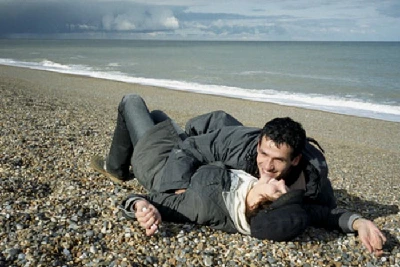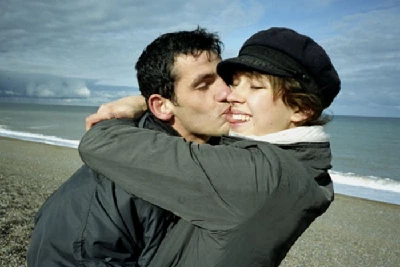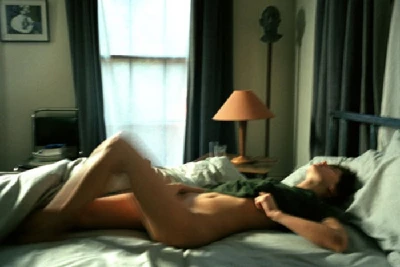Miscellaneous
-
Sex, Censorship and 21st Century Cinema
published: 20 /
6 /
2005

After Anthony Strutt's review of Mike Winterbottom's controversial '9 Songs' last month, Mark Rowland takes up the debate and writes about cinema, sex and censorship
Article
“I DON'T think there are any left to break, are there?”
Radio One film critic James King’s words stare out of the screen, unflinching. He is talking about on-screen taboos.
The words burrow into my brain, find my imagination and hold on tight - what if we had broken all of society’s taboos? What would the future of cinema (and art in general, for that matter) be after that point? What if the only thing left to break were laws?
My mind settles unpleasantly on this point for a while. It takes me to memories of Japanese director Takashi Miike’s films, 'Ichi the Killer' and 'Audition'. These feature, respectively, a man being hung by his skin on meat hooks and having hot oil poured over his back, and a young girl paralysing a man and doing unspeakable things to him with cheese wire.
“Imagine if someone did something like that for real in a film?” taunts my brain. I am put off my Skittles.
Three recent films are challenging what little taboos we have left. They taunt conservative censorship groups, urging them to fight back. They have, however, got by seemingly unnoticed.
'The Woodsman' and 'Downfall' are similar, in that they are thought provoking dramas with controversial lead characters. The former tells its story from the point of view of a paedophile called Walter (Kevin Bacon). The latter is a German film about the last days of Adolf Hitler (Bruno Ganz), put together from accounts of people around him at the time.
These are controversial in one way and one way only: society perceives these two characters to be monsters, while these films, though not condoning the actions of either, give them a sense of humanity.
The other film is totally different. '9 Songs' is director Michael Winterbottom’s "experiment’"; explicit and very real sex scenes intercut with concert footage. This film has caused the most controversy of all three.
Despite priding myself on being pretty open-minded, on reading about '9 Songs' I could not help being slightly shocked about it. It is probably something to do with being British, although the Americans have overtaken us in prudishness.
Real sex is a growing trend in indie cinema and is slowly becoming a more mainstream trend. In the last few years, directors have become more daring in how much they show in sex scenes. It seemed to start with 1999's 'Romance', the first mainstream film to show an erect penis, which is regarded as the last major sexual taboo in film and television.
Since then, films have been taking it further a step at a time. '9 Songs' has the most real sex in it out of any mainstream film. But the issue of whether sex in films is real has been around for years: “Explicit sex in the movies has always had people asking if it was real or not,” says James King. “The Japanese film from the 70s 'Ai No Corrida (In the Realm of the Senses)' was famously banned here for 20 odd years because it was presumed to be real. There has been some mainstream examples too – both involving Mickey Rourke, co-incidentally. 'Angel Heart', where he has sex with Lisa Bonet, was controversial as it was both inter-racial and presumed to be real - as were his sex scenes with real-life girlfriend Carrie Otis in 'Wild Orchid'. Interestingly though, whilst both of those films are examples of the 80s Hollywood obsession with raunchy sex in films, after 'Basic Instinct 'in ‘92 it died off a bit and headed to the straight-to-video market instead.”
None of the aforementioned sex scenes were real, however, whereas these definitely are, although, as James King says:
“It’s much more a staple of the arthouse circuit, such as the aforementioned '9 Songs', 'Baise-Moi' and 'Intimacy'. Because all of those feature male ejaculation, we can fairly safely assume they were all ‘for real’.”
I decided to take this up with the BBFC (British Board of Film Classification) who classify films in this country. So far the BBFC have given most of the ‘real sex’ films 18 certificates without cutting anything, which was also quite surprising to me.
I get through to Sue Clark, the head of communications at the BBFC.
“Ok,” I start. “First off, I’m not sure that many people know how the BBFC makes their decisions on…”
“I think a lot of people do know how the BBFC makes its decisions,” Sue cuts in. “We have lots of people writing in about our guidelines. We have a set of published guidelines on our website. Have you visited our website?”
Bollocks! I had looked on the website, but for some reason had completely missed the published guidelines. I am a little lost for words: “I did but…I didn’t realise…I…”
“The BBFC first published its guidelines in 1998, we didn't have guidelines before that, so people who haven’t kept up with what we’re doing are maybe mistaken in believing that no-one knows how we make decisions,” she continues.
“Oh,” is all I can manage. I get the slight feeling that she is enjoying this. The possibility that she has had to deal with a fair amount of accusatory calls from ‘moral’ Daily Mail-type journalists has not escaped my attention.
The interview continues shakily and I find that the BBFC keeps up with the changing views of society through ‘extensive research exercises’, large surveys on different aspects of film and what is acceptable. This, I guess, is pretty obvious when you think about it.
I ask Sue why '9 Songs' got an 18 certificate without being uncut. She cuts me down again.
“What is a very clear message in our 18 guidelines is that as long as material isn’t illegal or harmful, it isn’t right for the BBFC to intervene. The second point is what is the intent behind the film – is the intent behind the film, in the case of '9 Songs', pornographic in that its main reason for existing is sexual arousal, if it’s not, and in our opinion it’s not, there is no problem with us giving it an 18 certificate. In the case of '9 Songs', where people got worked up about it was in our guidelines it says the sex works can only be classed as R18. However, '9 Songs' isn’t a sex work, as its sole purpose isn’t sexual arousal. It has other artistic merit.”
Reeling from my terrible interview, my eyes open. Why should it shock me that people are having sex in non-porn films? After all, sex is something that most of us will do at some point in our lives. It does not hurt anyone. Yes, '9 Songs' is practically all sex, but by many accounts it is a pretty bad film. It is daring in its innovation, but that is still not enough to make people enjoy it.
“It is important to push social boundaries,” says James King. “Though still secondary to them being entertaining in the first place.”
On further thought, I realise that our view of what is acceptable and what is not is pretty skewed. Sex, even explicit simulated sex, still causes a stir among different groups, even if that sex is portrayed as an act of love. Films that feature graphic scenes of violence appear on screens across the world all the time, without any fuss.
“Violence is more acceptable in Hollywood now than ever,” agrees James King. “Films will continue to get more violent and I don’t think anyone will bat an eyelid. Sex is still the taboo topic, not violence. Look at the difference in controversy between 'Passion of the Christ' and 'Last Temptation of Christ'. The first was ultra-violent and Christians accepted it. The latter hinted that Jesus may have had sexual thoughts and there was a worldwide cry to ban it.”
All of this, of course, will change when society is ready. I do not think I will be going to see '9 Songs', as it does not appeal to me. That is the beauty of cinema: in general, most people decide what they want to watch before they go to the cinema.
“There's very little chance of people accidentally watching something they shouldn’t be,” says James King. “If you don’t like it, don’t go and see it.”
Picture Gallery:-

